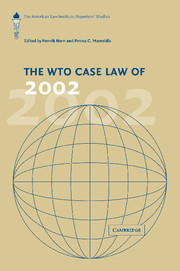Book contents
- Frontmatter
- Contents
- Foreword
- A note on the American Law Institute
- List of reporters
- 1 Introduction
- 2 United States – Section 129(c)(1) of the Uruguay Round Agreements Act (WTO Doc. WT/DS22/R of 15 July 2002): Beating Around (The) Bush
- 3 United States – Tax Treatment for “Foreign Sales Corporations” Recourse to Arbitration by the United States Under Article 22.6 of the DSU and Article 4.11 of the SCM Agreement (WT/DS106/ARB): A Comment
- 4 United States – Countervailing Duties on Certain Corrosion-Resistant Carbon Steel Flat Products from Germany (WTO Doc. WT/DS213/AB/R): The Sounds of Silence
- 5 United States – Countervailing Measures Concerning Certain Products from the European Communities (WTO Doc. WT/DS212/AB/R): Recurring Misunderstanding of Non-Recurring Subsidies
- 6 Canada – Export Credits and Loan Guarantees for Regional Aircraft (WT/DS222/R): A Comment
- 7 United States – Definitive Safeguard Measures on Imports of Circular Welded Carbon Quality Line Pipe From Korea
- 8 Chile – Price Band System and Safeguard Measures Relating to Certain Agricultural Products
- 9 India – Measures Affecting the Automotive Sector
- 10 United States – Section 211 Omnibus Appropriations Act of 1998 (WT/DS176/AB/R): A Comment
- 11 United States – Preliminary Determination with Respect to Certain Softwood Lumber from Canada: What is a Subsidy?
- 12 European Communities – Trade Description of Sardines: Textualism and its Discontent
- Index
12 - European Communities – Trade Description of Sardines: Textualism and its Discontent
Published online by Cambridge University Press: 06 July 2010
- Frontmatter
- Contents
- Foreword
- A note on the American Law Institute
- List of reporters
- 1 Introduction
- 2 United States – Section 129(c)(1) of the Uruguay Round Agreements Act (WTO Doc. WT/DS22/R of 15 July 2002): Beating Around (The) Bush
- 3 United States – Tax Treatment for “Foreign Sales Corporations” Recourse to Arbitration by the United States Under Article 22.6 of the DSU and Article 4.11 of the SCM Agreement (WT/DS106/ARB): A Comment
- 4 United States – Countervailing Duties on Certain Corrosion-Resistant Carbon Steel Flat Products from Germany (WTO Doc. WT/DS213/AB/R): The Sounds of Silence
- 5 United States – Countervailing Measures Concerning Certain Products from the European Communities (WTO Doc. WT/DS212/AB/R): Recurring Misunderstanding of Non-Recurring Subsidies
- 6 Canada – Export Credits and Loan Guarantees for Regional Aircraft (WT/DS222/R): A Comment
- 7 United States – Definitive Safeguard Measures on Imports of Circular Welded Carbon Quality Line Pipe From Korea
- 8 Chile – Price Band System and Safeguard Measures Relating to Certain Agricultural Products
- 9 India – Measures Affecting the Automotive Sector
- 10 United States – Section 211 Omnibus Appropriations Act of 1998 (WT/DS176/AB/R): A Comment
- 11 United States – Preliminary Determination with Respect to Certain Softwood Lumber from Canada: What is a Subsidy?
- 12 European Communities – Trade Description of Sardines: Textualism and its Discontent
- Index
Summary
Introduction
The facts of EC – Sardines are simple enough. A European Communities (EC) regulation stipulated that the designation Sardines could be used on preserved fish only for the genus Sardina pilchardus. The broad rationale claimed for this measure was to prevent consumer confusion. Allegedly European consumers associated the appellation “Sardines” with the pilchardus genus. Subsequently the Codex Alimentarius Commission set an international standard which effectively would allow other types of fish e.g. the genus Sardinops sagax, to use the word Sardine as part of its packaging designation. Peru, which exports Sardinops to Europe could not, under the Community regulation, use the designation Sardines in any shape or manner even though this prohibition would be contrary to the international standard set by the Codex Commission. Obviously, this would have adverse effects on the marketability of Peruvian sardines. Peru challenged the Community regulation claiming it violated Art. 2.1, 2.2, and 2.4 of the Agreement on Technical Barrier to Trade (TBT) as well as Art. III.4 of the General Agreement on Tariffs and Trade (GATT). The Panel exercised judicial economy and decided the case entirely on the basis of Art. 2.4 TBT, which provides as follows:
Where technical regulations are required and relevant international standards exist or their completion is imminent, Members shall use them, or the relevant parts of them, as a basis for their technical regulations except when such international standards or relevant parts would be an ineffective or inappropriate means for the fulfilment of the legitimate objectives pursued, for instance because of fundamental climatic or geographical factors or fundamental technological problems.
- Type
- Chapter
- Information
- The WTO Case Law of 2002The American Law Institute Reporters' Studies, pp. 248 - 275Publisher: Cambridge University PressPrint publication year: 2005
- 8
- Cited by



